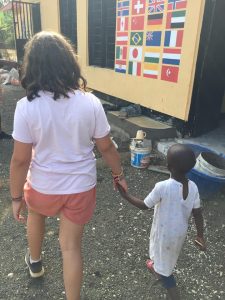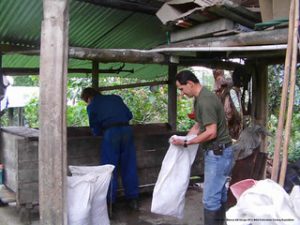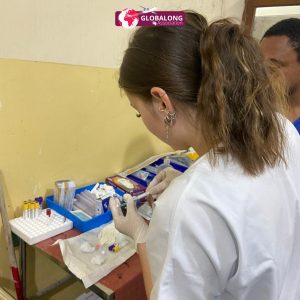How to Go on a Humanitarian Mission Abroad? Complete Guide for Volunteers
Table of Contents
- Why go on a humanitarian mission abroad?
- How to choose the right organization for a humanitarian mission
- Steps to apply for a humanitarian mission
- Preparation before departure: Training and required documents
- Financial aspects of a humanitarian mission abroad
- Living the experience on the field: Challenges and opportunities
- Conclusion: The impact of humanitarian volunteering abroad
Why go on a humanitarian mission abroad?
Participating in a humanitarian mission abroad is a rewarding experience, offering the opportunity to make a positive impact on struggling communities while living a unique personal adventure. Here are some reasons why going on a humanitarian mission is a gratifying decision:
- Helping others: Working on humanitarian projects helps improve the lives of people in need by providing essential resources such as education, healthcare, and clean drinking water.
- Personal enrichment: Humanitarian volunteering promotes personal growth by exposing you to new situations and allowing you to acquire skills that will be useful for your professional future.
- Discovering new cultures: Going on a humanitarian mission allows you to explore new cultures and learn to better understand the social and economic issues in other countries.
Going on a humanitarian mission is an opportunity to be helpful, to learn, and to create connections with people from different cultures. An unforgettable experience that goes beyond just traveling.

How to choose the right organization for a humanitarian mission
Choosing the right organization to go with is a crucial step. There are many organizations offering humanitarian missions, but it’s important to choose one that aligns with your values and goals. Here are some criteria to consider:
- Reputation and transparency: Choose a recognized and transparent organization regarding its projects and operations. Read testimonials from former volunteers to understand their experiences.
- Mission type and action area: Make sure the organization offers missions in areas that interest you, such as education, healthcare, environmental protection, or refugee assistance.
- Support and training: Check if the organization offers prior training to prepare you for the mission and local culture, as well as on-site support to guide you during your stay.
- Mission cost: Some organizations charge participation fees, which cover administrative costs, accommodation, and meals. Make sure you understand exactly what is included in these fees.

Steps to apply for a humanitarian mission
Once you have chosen the organization and the mission you are interested in, it’s time to apply. Here are the steps to follow:
1. Search for available missions
Start by exploring the missions offered by the organization. Check the duration, eligibility requirements, and the type of work you will be doing. You can find this information on the websites of NGOs or on online volunteer platforms.
2. Submit your application
Fill out the online application form, which usually includes information about your motivations, skills, and experience. Don’t forget to attach your CV and your cover letter, which should be clear and well-written. The cover letter should highlight why you want to help, how your skills fit the project, and what you hope to learn.
3. Wait for the response and prepare for the interview
Some organizations may conduct an interview to better understand your motivations and assess your fit for the project. Be prepared to explain why you want to go on a humanitarian mission and what you can bring to the organization. You will also be asked about your practical skills and previous experiences.
4. Confirmation and preparation
Once your application is accepted, the organization will provide you with practical information and details about the next steps, including preparation for the mission and administrative formalities. This usually includes information about the destination country, risks, and health precautions to take.

Preparation before departure: Training and necessary documents
Before you leave, good preparation is essential. This includes specific training, administrative procedures, and logistical planning.
1. Pre-departure training
Many organizations offer pre-departure training to prepare volunteers for the specific challenges they will face. This can include modules on local culture, crisis management, safety, and first aid. These training sessions are important to ensure you are well-equipped to work in difficult contexts and to understand the expectations of the local population.
2. Prepare the necessary documents
Make sure you have all the necessary documents, such as your visa, passport, travel insurance, and the vaccinations required by the host country. Don’t leave anything out to avoid any issues once you are on-site. Some organizations may also provide you with a kit containing practical information about the mission and the cultural aspects of the country.
3. Travel logistics
Book your flight tickets in advance, and make sure you know the details regarding your accommodation, local transport, and security conditions in the area where you will be working. Also, check the health recommendations for the country and prepare your first aid kit with the necessary medicines.

The financial aspects of a humanitarian mission abroad
Humanitarian missions abroad can incur costs, but there are several ways to reduce these expenses:
1. Registration and management fees
Registration fees cover the administrative management of the mission. These generally range from 200€ to 5000€, depending on the organization and the chosen mission. Make sure you understand exactly what is covered by these fees, such as accommodation, meals, and access to training.
2. Transport and travel
Travel costs (flight tickets, visa, local transport) are often the responsibility of the volunteer. To reduce these costs, it is advisable to book early or look for special offers. Some volunteers choose to fund their travel through fundraising campaigns or partnerships with local companies.
3. Accommodation and meals
Many organizations cover accommodation and meals, but it is important to verify these details before departure. If you need to fund them, it can cost between 15€ and 50€ per day, depending on the destination. Accommodations can vary from shared houses to simpler lodgings in rural areas.
4. Scholarships and funding
Look for scholarships or funding specifically for humanitarian volunteering. Some NGOs offer grants to cover part of the costs, or you can organize fundraising campaigns to finance your mission. You can also explore external funding options from funding organizations.
For more information, feel free to contact us at [email protected]
To learn more about the Globalong Association and its members, visit

